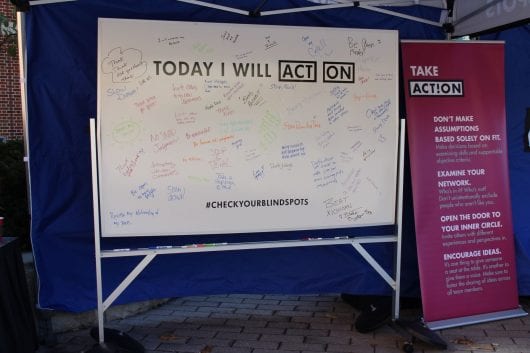
Participants were encouraged to write on the board how they planned to put what they had learned from the Check Your Blind Spots tour into action. Credit: Attiyya Toure | Lantern Reporter
As students, staff and faculty made their way past the West Plaza of the Union Wednesday, they might have noticed a large truck, followed by t-shirts, juice jugs and a vast array of cookies.
This was a part of the mobile exhibit “Check Your Blind Spots,” an interactive experience designed to educate the general public about unconscious biases.
Tayo Clyburn, executive director for mission and strategic partnerships within the Office of Diversity and Inclusion, defined blind spots as inherent attitudes everyone has, which can result in judgments and decisions especially damaging to minority groups.
“People don’t intend to exclude others, they don’t intend to cause injury to other people,” Clyburn said. “But because we’re moving so fast in our thinking, and we rely so much on what we might get from the media — which uses a lot of stereotypes, particularly for marginalized populations — that when we rely on those, we’re to make quick decisions because it’s easier that we do exclude, that’s a part of human nature.”
The event was held as a collaborative effort between Ohio State’s Office of Diversity and Inclusion, and CEO Action for Diversity and Inclusion, a national organization dedicated to advancing diversity within the workplace.
“Check Your Blind Spots” is a part of a national mobile tour that the CEO Action for Diversity and Inclusion hosts throughout the year.
“We’re a small number of 53 universities that have signed on to it,” Clyburn said. “It’s mostly organizations from the private sector and corporate, and this is a part of that larger commitment.”
As participants made their way into the truck, they were shown a video, an interactive quiz, as well as the organization’s website, all of which were aimed at recognizing unconscious biases and working to actively eliminate them to further promote diversity and inclusion.
“It encourages awareness for you to slow down and say ‘maybe I made some snap judgments that could cause injury to another party. So let me think about that and bring awareness to myself, double check to make sure there’s nothing in my blind spot,” Clyburn said.
Nashalie Diaz, a fourth-year in social work, thought the experience would provide general information about making the university a more inclusive place, but was surprised as she recognized her own blind spots in her everyday life.
“I learned about things I do without meaning to do it,” Diaz said. “In the video they talked about choosing where to sit on the bus and I do that constantly, I noticed today. When I get on the bus sometimes I’m like, ‘I shouldn’t sit there,’ and I didn’t realize I did that.”
After finishing the experience, participants were encouraged to sign a bulletin labeled “Today I Will Act On,” in order to put everything they learned into practice.
“It’s sort of like a stamp, once you come out on the other side,” Clyburn said. “Think about what actions you’re going to take immediately today, that maybe for some people action turning into practices that — moving forward — are more thoughtful and aware of everything they do.”
As a thank you for engaging in the experience, participants were also given a free T-shirt, warm apple cider and a cookie.
One major takeaway Diaz got was not letting unconscious bias affect the way she sees or treats other people.
“If I see someone, I like to see their potential and what they have to give, not how they look on the outside,” she said.


